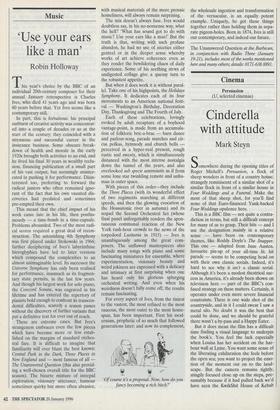Music
`Use your ears like a man'
Robin Holloway
This year's choice by the BBC of an individual 20th-century composer for their annual January retrospective is Charles Ives, who died 41 years ago and was born 80 years before that. Yet Ives seems like a contemporary still.
In part, this is fortuitous: his principal outburst of creative activity was concentrat- ed into a couple of decades or so at the start of the century; they coincided with a strenuous and successful career in the insurance business. Some obscure break- down of health and morale in the early 1920s brought both activities to an end, and he lived his final 30 years in wealthy reclu- sion, financing publication of a small part of his vast output, but seemingly uninter- ested in pushing it for performance. Disin- terested too, preferring to forward the radical juniors who often remained igno- rant of the fact that his own vaunted dis- coveries had predated and sometimes pre-empted their own.
This meant that the chief impact of his work came late in his life, then posthu- mously — a time-bomb in a time-capsule. Problems abounded. Two of the most radi- cal scores required a great deal of recon- struction. The astonishing 4th Symphony was first played under Stokowski in 1966; further deciphering of Ives's labyrinthine hieroglyphics have led to later versions which compound the complexities to an almost unimaginable level. Its successor the Universe Symphony has only been realised for performance, inasmuch as its fragmen- tary state permits, in the last few years. And though his largest work for solo piano, the Concord Sonata, was engraved in his lifetime and has entered the repertory of pianists bold enough to confront its transcen- dental difficulties, scarcely a season passes without the discovery of further variants that put a definitive text for ever out of reach.
These are extreme cases. But Ives's strangeness embraces even the few pieces which have become more or less estab- lished on the margins of standard orches- tral fare. It is difficult to imagine that familiarity will ever blunt the best known: Central Park in the Dark, Three Places in New England and — most famous of all The Unanswered Question (this also provid- ing a well-chosen overall title for the BBC season). The bizarre mixture of intrepid exploration, visionary utterance, humour sometimes quirky but more often abrasive, with musical materials of the more prosaic homeliness, will always remain surprising.
The mix doesn't always fuse. Ives would doubtless say, in his no-nonsense way, what the hell? 'What has sound got to do with music? Use your ears like a man!' But the truth is that, writing with such profuse abandon, he had no use of niceties either genteel or in the deeper sense whereby works of art achieve coherence even as they render the bewildering chaos of daily experience. Some of his seething stews of undigested collage give a queasy turn to the robustest appetite.
But when it does work it is without paral- lel. Take one of his highpoints, the Holidays Symphony. It dedicates each of its four movements to an American national festi- val — Washington's Birthday, Decoration Day, Thanksgiving and The Fourth of July.
Each of these celebrations, lovingly evoked by adult recapture of a boyhood vantage-point, is made from an accumula- tion of folkloric bric-a-brac — barn dance and parlour-song, parade marches and cir- cus polkas, hymnody and church bells perceived in a hyper-real present, rough rustic and sweaty, which is simultaneously distanced with the most intense nostalgia down the tunnel of the years, and also overlooked sub specie aeternitatis as if from some lone star twinkling remote and unhu- man in outer space.
With pieces of this order—they include the Three Places (with its wonderful effect of two regiments marching at different speeds, and then the glowing evocation of the Housatonic river in autumn) and its sequel the Second Orchestral Set (whose final panel unforgettably renders the spon- taneous communal reaction of the New York rush-hour crowds to the news of the torpedoed Lusitania in 1915) — Ives is unambiguously among the great com- posers. The unflawed masterpieces also include many songs with piano and some fascinating miniatures for ensemble, where experimentation, visionary beauty and weird jokiness are expressed with a delicacy and intimacy at first surprising when one has heard only his glorious splurging orchestral writing. And even when his weirdness doesn't fully come off, the results remain fascinating.
For every aspect of Ives, from the tiniest to the vastest, the most refined to the most raucous, the most outré to the most home- spun, has been important. First his mod- ernism, prophetic of so much that followed generations later; and now its complement, Vicourse it's a proposal. Now, how do you fancy becoming a rich bitch?' the wholesale ingestion and transformation of the vernacular, is an equally potent example. Uniquely, he got these things together rather than holding them in sepa- rate pigeon-holes. Born in 1874, Ives is still our contemporary, and indeed our future.
The Unanswered Question at the Barbican, in conjunction with Radio Three (January 19-21), includes most of the works mentioned here and many others; details: 0171-638 8891.


























































 Previous page
Previous page